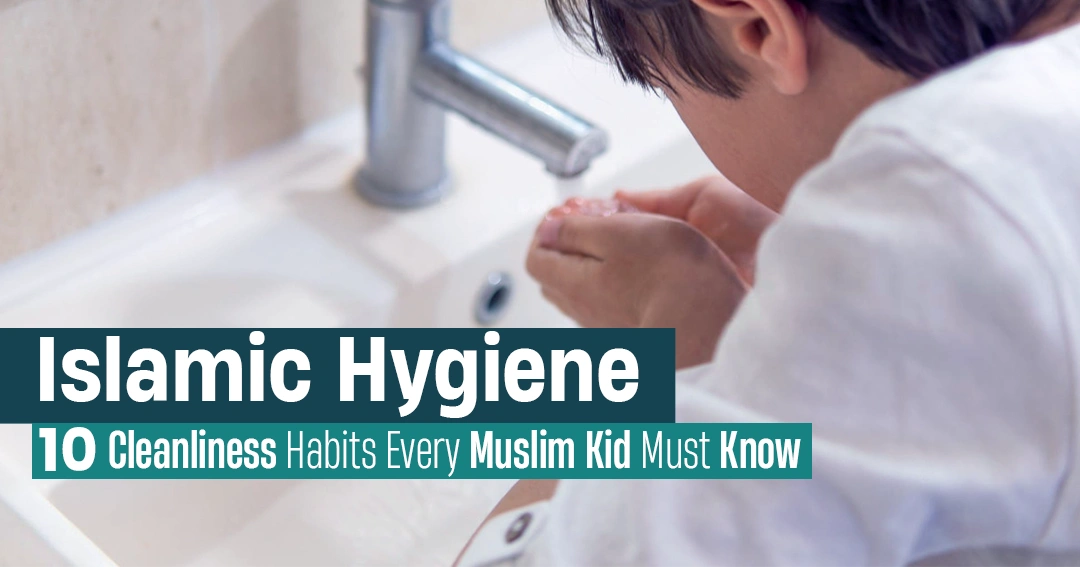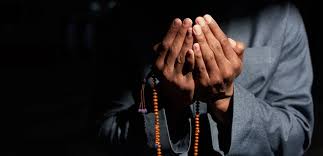Islamic hygiene rules for children are essential habits that help young Muslims grow up healthy, confident, and spiritually connected. Teaching kids about cleanliness in Islam goes beyond just physical care, it builds a strong foundation of faith and discipline.
In this article, we’ll explore 10 important cleanliness habits every Muslim child should know, making it easier for parents and learners to embrace these teachings with joy and understanding.
Why Islamic Hygiene Rules Matter for Children?

Islamic hygiene rules for children is not just about staying physically clean, it’s all about fostering strong Islamic values from an early age in life. Having these habits instills responsibility, spiritual awareness, and respect both for their bodies and for Islamic manners for kids.
1. Cleanliness Is a Part of Faith in Islam
Hygiene in Islam is greatly emphasized. The Prophet Muhammad (peace be upon him) advised that “Cleanliness is half of faith.” When we’re teaching Islamic hygiene rules for children, we’re not merely imparting instruction in washing or staying clean, we’re guiding them to fulfill a religious obligation.
These principles link body care routines to spiritual growth, making everyday tasks like brushing teeth or washing hands acts of worship.
2. The Habits Established Early Become Lifelong Principles
Kids pick up routines quickly, and routines established early in life can endure a lifetime. Creating Islamic hygiene rules for children at an early age provides the foundation for a balanced, obedient lifestyle founded on faith.
From performing wudu before prayer to clipping nails every seven days, those simple things teach a person responsibility and respect for Islamic tradition.
3. Creating the Relationship Between Body and Adoration
One of the beautiful things about Islam is the manner in which it links cleanliness to acts of worship. Children who are educated in Islamic hygiene rules for children understand that being clean is not merely for health reasons,
it’s also a condition for performing salah, reading Quran, and attending the mosque. Thus, hygiene comes linked to purpose, rather than chore.
4. Raising Spiritually Conscious and Healthy Individuals
Teaching Islamic hygiene rules for children empowers them with the tools to maintain their faith and health. Clean children are healthier, more assertive, and more capable of participating in Islamic ceremonies and social life.
These principles also impart discipline, which is transferred to other areas like school, prayer, and family.
10 Cleanliness Habits Every Muslim Kid Must Know

Teaching Islamic hygiene rules for children children is made easier if broken down into simple, easy-to-follow practices that can be repeated every day by the children.
1. Performing Wudu correctly
Wudu, or ablution, is the foundation of Islamic cleanliness. Teaching children to do Wudu correctly puts them in a position to pray and keeps them spiritually and physically clean.
Have fun with it by showing the step-by-step process, emphasizing washing hands, face, and feet properly, something that provides confidence in their religious practice and reinforces Islamic hygiene rules for children naturally.
In Tareequl Jannah Academy, children are taught Wudu through interactive videos and guided practice so that it is easily remembered and enjoyed.
2. Handwashing Before and After Meal Times
Handwashing before and after eating is one of the simplest but most Islamic hygiene rules for children. The Prophet Muhammad (peace be upon him) referred to this as a way of cleanliness and hygiene.
Teaching children to wash their hands with soap and water protects them against germs and teaches them respect for food.
3. Brushing Teeth or Using the Miswak Daily
Oral health is a vital part of Islamic hygiene rules for children. The Prophet (PBUH) recommended the Miswak for brushing teeth daily. Though children like toothbrushes these days, introducing the Miswak makes them love Sunnah and personal hygiene.
4. Nail Trimming and Nail Cleaning
Dirty or long nails have dirt and germs stuck in them, and that is why nail clipping is a fundamental Islamic hygiene rules for children. Clipping nails weekly is how one instills good personal cleanliness and what is good personal training, as per the Prophet (PBUH).
5. Showering Regularly and Understanding Ghusl
Regular bathing keeps the body clean and is highly recommended in Islam. Teaching children how to differentiate between bath and Ghusl (purification of the whole body) will prepare them for important acts of worship like Friday prayer and fasting.
6. Wearing Clean Clothes for Prayers and General Use
Wearing neat clothing is a fundamental part of Islamic hygiene rules for children. Kids must learn that their clothing ought to be neat and clean, especially when making prayers. Wearing clean clothing shows respect towards Allah and the worship act as well.
7. Using the Toilet in an Islamic Way
Teaching kids the correct Islamic toilet manners is among the most significant Islamic hygiene rules for children. They include entering using the left foot, saying the correct du’as, and washing with water first before washing hands thereafter. All of them promote cleanliness and respect for the body.
8. Coverings Sneezing and Coughing
Good manners like covering sneezes and coughs are part of Islamic hygiene rules for children. The Prophet Muhammad (PBUH) taught us to say “Alhamdulillah” after sneezing and to cover our mouths to prevent spreading germs. Teaching kids these simple acts help keep them and those around them healthy.
9. Keeping the Environment Clean
Picking up after oneself and helping maintain the surroundings clean is an important Islamic hygiene rules for children. Children learn that Islam encourages clearing harm and filth off the path, such as bringing home garbage and keeping clean spaces at school and home.
By engaging in interactive tasks, Tareequl Jannah Academy teaches children to be green-oriented as part of their Islamic duty.
10. Excessive Cleanliness During Ramadan and Fridays
Islam advises practicing excessive cleanliness during special events like Ramadan and Jumu’ah (Friday) prayer. Teaching children to perform Ghusl, wear clean attire, and keep their mouths clean during such times instills a sense of belonging towards Islamic worship and cleanliness in them.
How To Teach Islamic Hygiene rules for children?

Teaching Islamic hygiene rules for children is a rewarding process that requires patience, commitment, and creativity.
As parents and caregivers, you are the most effective role models in instilling your children with these practices with love and support. Here are some useful tips to help guide you through the process:
1. Lead by Example
Kids learn better from watching their parents. Show your children how you practice Islamic child cleanliness practices in your everyday routine, whether it’s performing Wudu, washing before eating, or being clean while praying. By seeing that you do take care of cleanliness, they are more likely to adopt the same naturally.
2. Make Use of Stories from Prophet Muhammad’s Life
Retell simple stories from the Seerah (Prophet Muhammad, peace be upon him) that highlight the importance of hygiene and cleaning. The stories are made understandable by Islamic hygiene rules for children and make them open to the Sunnah voluntarily.
3. Create Fun and Interactive Habits
Make keeping up with the hygiene work fun. Employ a colorful chart, stickers, or rewards to track your child’s improvement in keeping up with Islamic hygiene rules for children. Rewarding good behavior fosters practice consistency without causing stress.
4. Start with One Habit at a Time
Don’t overwhelm your child with teaching all the habits simultaneously. Master one cleanliness rule, like hand washing before meals, until it is habitual, and then introduce the next one. This simplifies learning and makes it sustainable.
5. Be an Encourager and Gentle Reminder
Children are inquisitive. Encourage them to ask questions about cleanliness and Islam, and respond in simple, direct terms. Reminding them subtly throughout the day can get them to be clean without rebuking them.
If you found this article about Islamic hygiene rules for children useful don’t forget to share it with your friends and family.
Help Your Child Grow with Beautiful Islamic Manners
Looking for practical ways to raise well-mannered, confident Muslim children? Explore our enriching collection of articles designed to teach kids the essential Islamic values every young Muslim should know.
From learning Islamic manners for children and building strong Islamic character to mastering Islamic hygiene rules and masjid etiquette, each article is crafted to make Islamic teachings simple, relatable, and engaging for kids.
Plus, don’t miss the timeless wisdom of the Prophet ﷺ in our guide on Prophet Muhammad’s stories about manners for kids, and help your child learn the rights of neighbors in Islam and the proper Islamic way of speaking with love and respect.
Start reading now and guide your child toward becoming a well-rounded Muslim with beautiful adab and character.





